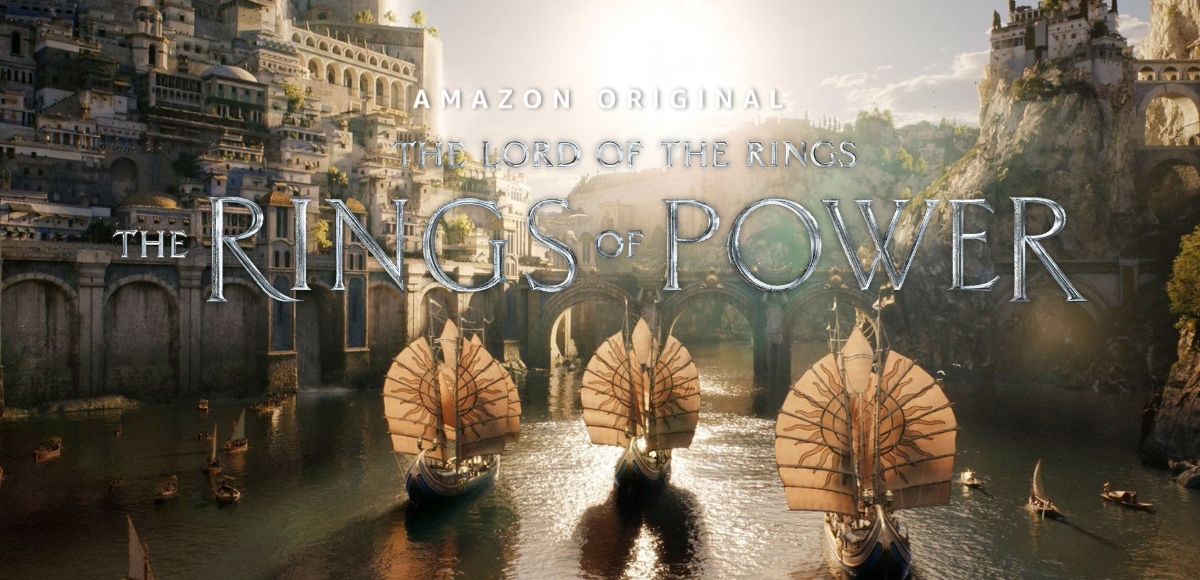At over a billion dollars, The Lord of the Rings: The Rings of Power is the most expensive TV series ever made. It jumped up to #1 on Prime Video just hours after it dropped. And even if you aren’t a fan of the LOTR or Hobbit movies or think Middle-earth is just the name of a local vegan restaurant, this series is a must see. Bravo, Amazon Studios. Bravo.
J. R. R. Tolkien is well-known for his intricate detail. The man could write about a single blade of grass for a dozen pages, front and back. And his imagination was so creative that he invented his own language. Amazon Studios kept all of that in mind while bringing his worlds to life in the most breathtaking way.
In this new series, we are taken back in time to meet a much younger Galadriel, the Elven queen praised for her beauty and power, who is played by Morfydd Clark. We first saw Galadriel played by Cate Blanchett, in The Lord of the Rings. Watch her journey unfold and legacy begin as she confronts the re-emergence of evil in Middle-earth. Move over Eleven, there’s a new (thousands years old) Elven in town.
Filters are now available for Amazon Studios’ The Lord of the Rings: The Rings of Power.


“R.R.” Tolkien? Infamous?
The writer of this post needs to take some lessons in elementary vocabulary and needs to do extensive research on the subject matter to which he or she is referring before representing either VidAngel or an author of whom they clearly know nothing — to the world. J.R.R. Tolkien (yes, there is a “J” at the beginning of his name) is John Ronald Reuel Tolkien.
Fame certainly came to this Professor of English Language and Literature due to his staggering intellect and literary attention to detail, as evidenced not only in his creating a series of books, but also by envisioning and penning the back-story to them as well.
However unlike the tarnished reputation which the author of this article has sought to impose upon him, neither J.R.R. Tolkien’s writings nor his person have ever been described as “infamous”.
A basic definition of “infamous” (taken from both English or American dictionaries) describes something or someone that has achieved recognition because they are corrupt, evil, wicked or abominable. Used in sentences, each dictionary used the term, “infamous war criminal”. To describe an extraordinary man of sterling character and an amazing work ethic with the word, “infamous” is beyond understanding.
In addition, the disrespect shown to Tolkien by providing such an inaccurate portrayal of his work with, “the man could write about a single blade of grass for a dozen pages, front and back”, is absolutely untrue. His descriptiveness always served a purpose and eager readers devoured his words because it made the world into which they had immersed themselves all the more real. Any details he described were essential to the overall story.
Literary critics and academics alike have acclaimed Tolkien’s works as among the highest forms of literature and consider them to be the pinnacle of contemporary english prose. “Like, really really wordy” and “obsessively compulsive about grass and stuff” is not how fans of his works describe him.
Perhaps the author of this article would be in a better position to comment upon a television series and how it compares to J.R.R. Tolkien’s literary genius, his worldview and philosophy had he or she begun their research by being a scholar or avid reader of the books that he wrote.
At the beginning of my response I lamented that the author of this article needed a basic vocabulary primer, but I must recommend a basic education in grammar as well:
The term “elven” is an adjective, not a noun. An adjective describes a noun. Elven is not an object, or a person or a place. It can describe an object, person or place. “An elven blade” is a blade made by elves. The first use of the word in the posting was spelled like the number. Eleven comes after ten; it’s got nothing to do with elves. It’s as if the writer, trying to reach an English speaking, English reading audience is unfamiliar with the language themselves.
“Move over Eleven, there’s a new (thousands years old) Elven in town.” Really? What does that even mean? VidAngel, who oversees this representation of your work? It certainly does not reflect well upon you. “VidAngel: a service that achieved infamy.”
Good morning! That would be me! First off, we appreciate your feedback. In the first three drafts, it was J.R.R. Tolkien and that was the result of an irresponsible copy-and-paste job. I sincerely apologize; good eye. To answer your last question, we made a sad attempt at a pop culture reference. Eleven is a character in a popular TV series called “Stranger Things.”
Wow. That guy is a turd. The reference to Eleven was quite clever, Chloe. 🙂
Hey, I’m just wondering if the series the Ring is clean to watch with Vid Angel filters.
We watched the first two episodes with the Clearplay subscription we have and as is usually the case, there were still scenes with immodestly dressed people. I recognize how difficult this is to filter in that you cannot remove a character or put new cloths on them, but what about blurring? I would prefer things that are currently removed be removed plus they blur immodestly dressed persons wardrobes. Thanks
That is a great question! We have available filters for immodesty. An example of the filter description from the first episode of “The Lord of the Rings: The Rings of Power” is: “A woman’s cleavage is visible.”
While we don’t have a blurring feature, we are hopeful for more filtering options in the future!